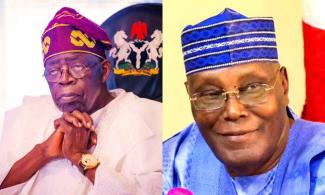
Atiku said the apex court’s refusal “to grant the leave as the respondents have argued, will amount to undue technicality”.
The former Vice President, Abubakar Atiku, has urged the Supreme Court of Nigeria to reject technicality and grant his application for leave to tender fresh and additional evidence to support his claim that President Bola Tinubu submitted a forged document to the Independent National Electoral Commission (INEC) to contest the presidential election.
Atiku, the candidate of the Peoples Democratic Party (PDP) in the February 25 presidential election reminded the apex court that the duty of the court to ensure substantial justice is important.
He described the matter as huge as it would decide if the candidate for the highest office in the land presented a forged certificate or not.
This was stated in Atiku’s reply on point of law to Tinubu’s objection to the grant of leave to the former President to present fresh evidence regarding his alleged forgery of the Chicago State University certificate before the apex court.
Atiku lost to Tinubu in the 2023 presidential election as declared by the Independent National Electoral Commission (INEC) on March 1.
Atiku and the PDP subsequently filed a petition at the Presidential Election Petition Tribunal, seeking the nullification of Tinubu’s election over alleged irregularities, amongst other arguments.
However, on September 6, the five-member panel led by Justice Haruna Tsammani dismissed Atiku and the PDP’s petition, describing it as unmeritorious.
Atiku later filed an appeal at the Supreme Court, asking it to overturn the judgement of the tribunal.
The former Vice President also filed fresh evidence alleging that Tinubu forged the Chicago State University certificate submitted to the electoral body ahead of the presidential election.
However, Tinubu’s team of 17 lawyers comprising 10 Senior Advocates of Nigeria, led by Chief Wole Olanipekun (SAN) argued that Atiku’s appeal lacks merit.
Tinubu asked the Supreme Court to dismiss the appeal filed by Atiku for abuse of court process.
The lawyers explained that he had only sought to reliefs targeted at the president without canvassing issues that would benefit them in their final written address.
Tinubu accused Atiku of “cooking up allegations” of discrepancies against him.
He said, “It was at this point that they rolled out their drums of cooked up allegations of discrepancies in the 2nd Respondent’s academic qualifications, dual nationality and sundry bemusing allegations from the backdoor.”
But Atiku faulted Tinubu's submission, insisting that issues of merit ought not to be determined or pronounced upon at the interlocutory stage.
He said, “The Supreme Court, as the Apex Court and indeed the Policy Court, has intervened time and again to do substantial justice in such matters of great constitutional importance, as it did in the case of Ameachi vs INEC (2008) 5 NWLR (Pt. 1080) 227 and Obi vs. INEC (2007) 11 NWLR (Pt. 1046) 565. The Supreme Court applied the principle of ubi jus ibi remedium to ensure that substantial justice is done in such novel scenarios."
Atiku said the apex court’s refusal “to grant the leave as the respondents have argued, will amount to undue technicality”.
He said, “The need to rebuff, eschew and reject technicality and the duty of Court to ensure substantial justice is very germane in this matter, given the gravity of the constitutional issue involved in deciding whether a candidate for the highest office in the land, the office of President of the Country, presented a forged certificate or not.
“In urging the Honourable Court to overrule the objections of the Respondents, we can do no better than to commend to your noble Lordships the insightful words of the Supreme Court in Assah & Others V. Kara & Others (2014) LPELR-24212(SC), per Rhodes-Vivour, JSC as follows.
“Law is blind. It has no eyes. It cannot see. That explains why a statue of a woman with her eyes covered can be found in front of some High Courts. On the contrary, justice is not blind. It has many eyes, it sees, and sees very well.
“The aim of Courts is to do substantial justice between the parties and any technicality that rears its ugly head to defeat the cause of justice will be rebuffed by the Court.”
He also said, “That the case is not whether 2nd Respondent attended Chicago State University but whether he presented a forged certificate to the Independent National Electoral Commission (INEC).
“That at the trial, a National Youth Service Corps certificate with serial number 173807 presented by the 2nd Respondent to the 1st Respondent was equally tendered by the Appellants/Applicants at the trial as “Exhibit PBD 1A” with the name Tinubu Bola Adekunle, which is annexed herewith as Exhibit J.”